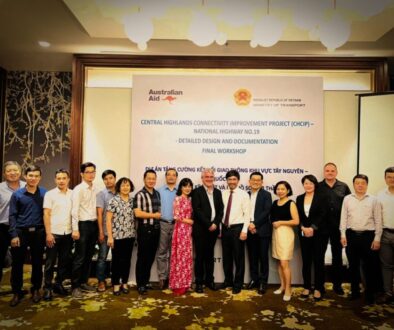Supporting TDSI to develop a more accessible public transport network
IN BRIEF
Did you know that only 4% of public transport in Vietnam is considered to be accessible by people with disabilities? This statistic excludes anyone else with accessibility needs, such as children, pregnant women, people with prams, elderly, and illiterate people, to name just a few.
As accessible, affordable and reliable transport can provide life-changing opportunities for people, the Transport Development and Strategy Institute (TDSI), together with Aus4Transport, launched a new activity focused on improving accessibility to the transport network on the 21 January 2021.
The activity, Building Capacities for Transport Authorities to Enhance a Universally Accessible Public Transport Network, will contribute to create opportunities in education, employment, health care or housing. It will especially consider the 6.2 million people in Vietnam who live with a disability and will add to the efforts that the Vietnamese Government has already been making towards a more inclusive and socially responsible government.
KNOW MORE…
The Transport Development and Strategy Institute (TDSI), together with Aus4Transport, held on 21 January 2021 the kick-off meeting of a new activity: Building Capacities for Transport Authorities to Enhance a Universally Accessible Public Transport Network.
The activity is part of the partnership between the Australian Embassy in Vietnam and the Ministry of Transport, and aims to improve knowledge and implementation of the current regulations, introduce the concept of universal design, change attitudes, and assist local transport agencies to plan and design for accessible transport infrastructure.
According to the Ministry of Labour – Invalids and Social Affairs (MOLISA), by 2019, the estimated access rate for people with disabilities was only 63% for airports, 26% for railway stations, 30% for bus stations and 3.5% for public transport. This severely low accessibility rate leaves a huge percentage of the population deprived of crucial opportunities in education, employment, health care or housing. Accessible transport could break the cycle of dependency and poverty for many disadvantaged people and become a key factor for reducing the social inequality gap.
Since 2010, the Government of Vietnam has been issuing different laws, decrees and regulations to ensure accessibility for people with disabilities. Unfortunately, practical implementation of these new standards has faced many difficulties, resulting in an alarming lack of accessible infrastructure. To give just an example, according to research undertaken by the Center for Disability Research and Capacity Development (DRD), a non-governmental organization on disability, in 2019, only 78 out of 1,800 public infrastructure facilities in Districts 1, 3 and 10 in Ho Chi Minh City were accessible to people with disabilities.
Working with local officials and civil society, the activity will evaluate the current implementation of accessible transport infrastructure in four selected provinces / cities across Vietnam (Hai Phong, Hue, Tien Giang and Can Tho). Based on the results of this assessment, training will be developed and delivered to the local authorities with two main objectives: to raise awareness about the important social benefits achieved through universal design; and to improve their knowledge on how to implement existing regulations to create a more accessible transport network.
As a final step of the activity, the Government of Australia, in its partnership with the Ministry of Transport of Vietnam through Aus4Transport, will provide technical and financial assistance for a minimum of 3 infrastructure projects in the selected provinces that will apply universal design. Each project will be supported by approximately AUD 10,000 (USD 6,000).
Mrs. Nguyen Thi Phuong Hien and Dr. Pham Hoai Chung, both TDSI Deputy Director General, will be coordinating this activity.




